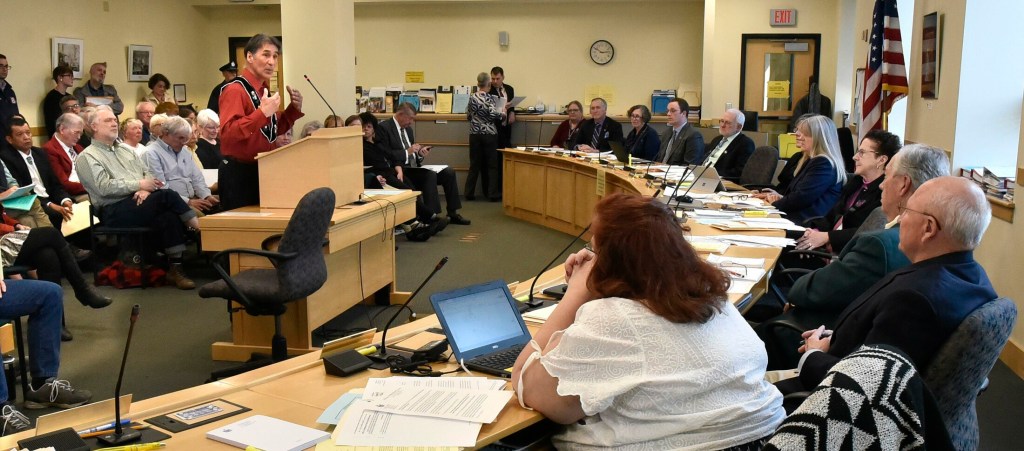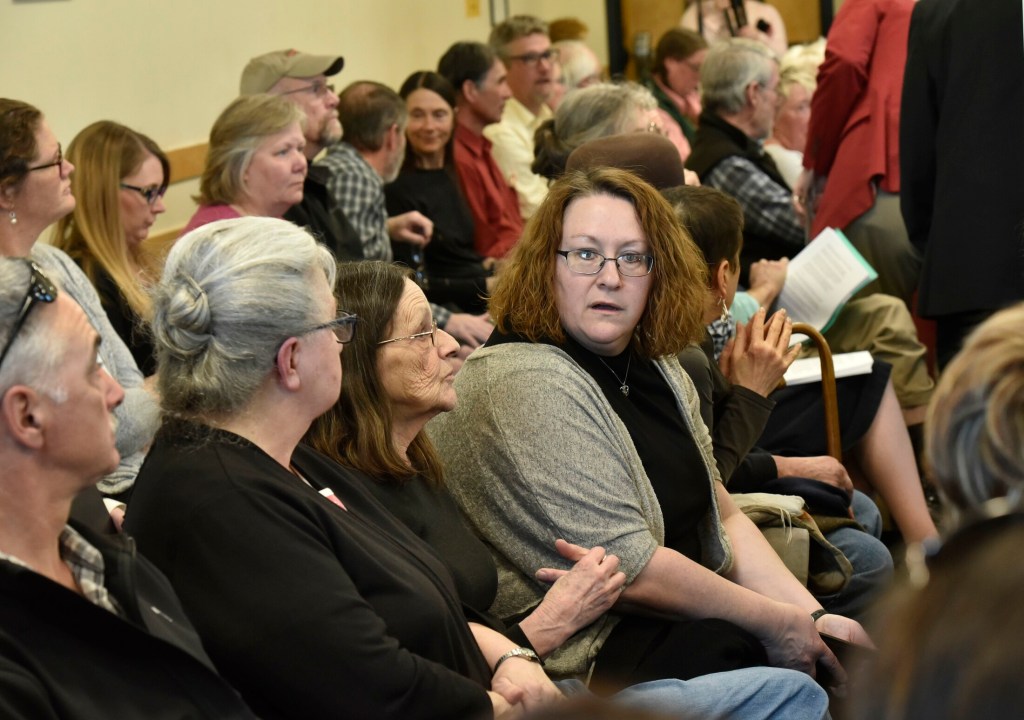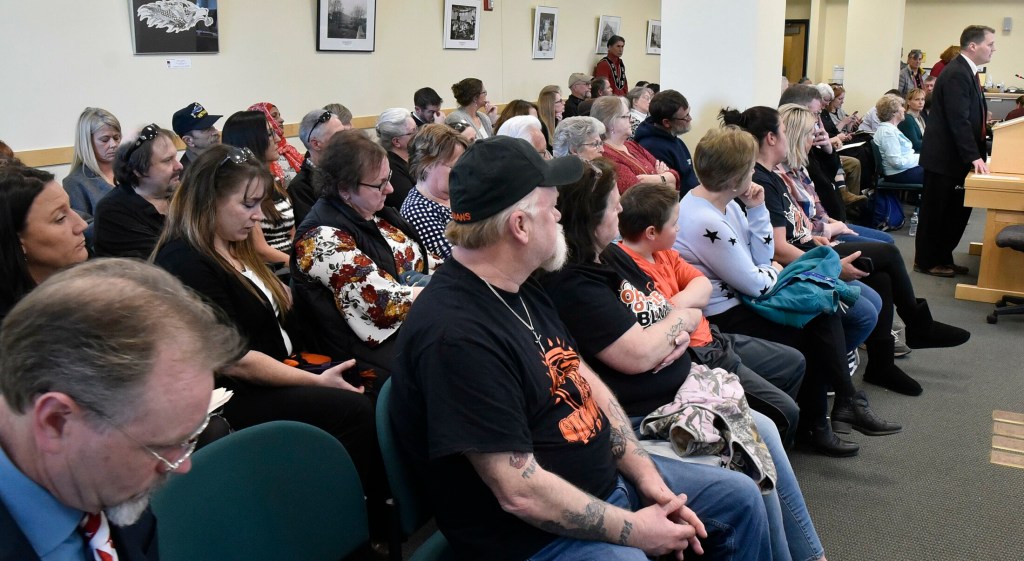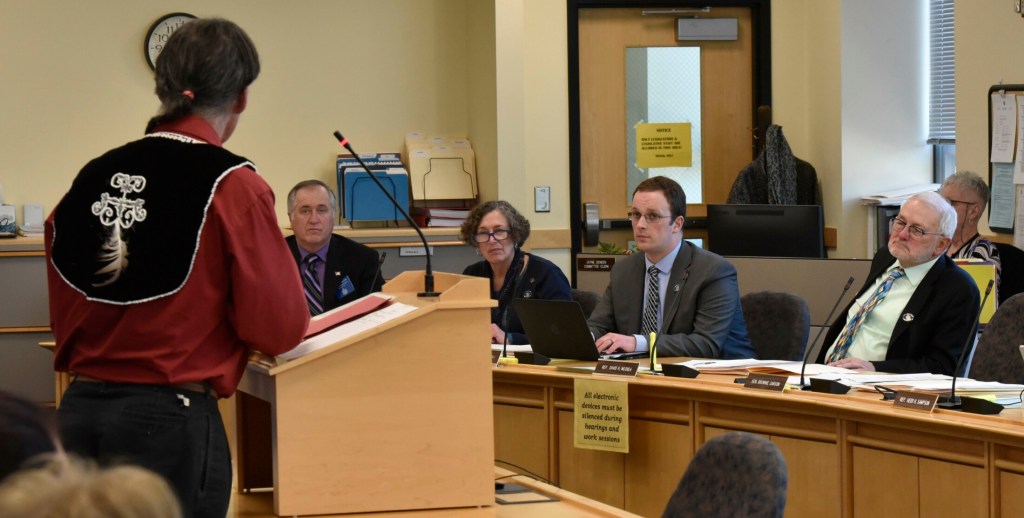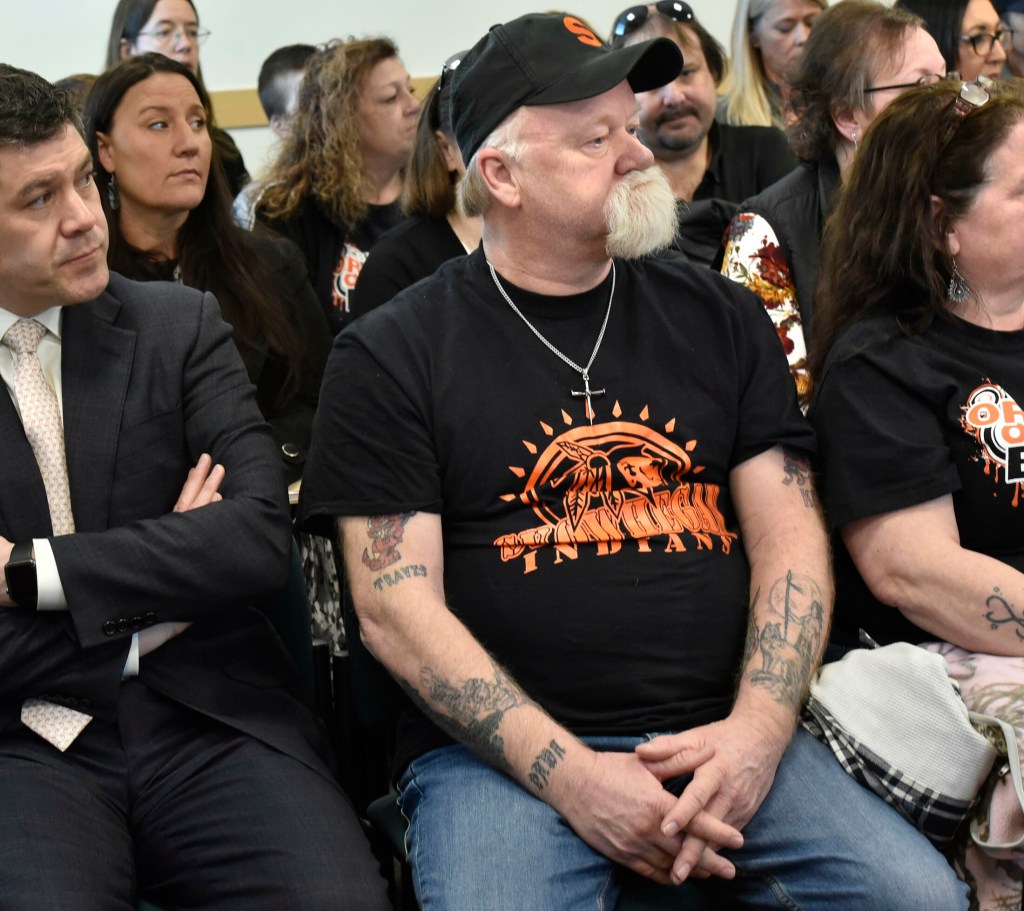AUGUSTA — Room 208 of the State House’s Cross Building was packed to capacity as members of the public gathered to share reactions to a proposed bill to ban Native American mascots from public schools.
The legislative Committee on Educational and Cultural Affairs held public testimony on a bill to ban the use of Native American imagery and mascots from public schools in the state on Monday afternoon.
Voices in support of the bill, L.D. 944, outnumbered voices in opposition by approximately 23 to 8.
Barry Dana, former chief of the Penobscot Nation, said that the use of Native American iconography is far from a complimentary gesture. Proponents of the mascot had repeatedly claimed that the name was intended to show respect for the people who occupied Skowhegan before colonization.
“Am I honored as a Native American person (by the use of these mascots)? No,” he said. “It’s the same thing as shoving garlic down my throat and telling me I like it.”
“(This is a) legacy of racist entitlement and distorted imagery related to our people,” added Sherri Mitchell, a member of the Penobscot Nation and indigenous rights attorney.
Rep. Benjamin Collings, D-Portland, introduced the bill to the committee on Monday. As someone who grew up in Fort Kent during the era of the Fort Kent Warriors — a mascot that has since been retired — Collings acknowledged that communities derive pride and a sense of identity around their school district’s mascot. He added that a sense of identity can be maintained even with new iconography.
“Your mascot doesn’t define you,” he said.
Numerous individuals in favor of the bill stated that the use of Native American imagery is harmful to the self-esteem and academic success of Native American students, referencing a study published by the American Psychological Association.

Jim Macarthur of Canaan speaks against a proposed law to ban the use of ‘Indian’ as a nickname or mascot in Maine schools in Augusta on Monday at a well-attended hearing on the bill, L.D. 944. Morning Sentinel photo by David Leaming
“What is best for the students in a school — if there is a mascot deemed to be offensive, is that in the best interest of the students?” Collings asked.
Rep. Genevieve McDonald, D-Stonington, a co-sponsor of the bill, said that lawmakers should prioritize the voices of the state’s Native American population.
“If the people you are claiming to honor are offended by your actions, you should stop it,” she said.
Rep. Kent Ackley, I-Monmouth, agreed.
“One cannot show respect by doing something that is interpreted as disrespectful,” he said.
Those in opposition to the bill argued that the proposal threatens freedom of speech, is too broad, takes away local control and is unfairly targeted at School Administrative District 54.
By a vote of 14-9, SAD 54 became the last school district in the state to retire a Native American nickname — the Indians — for its sports teams on March 7.
James McArthur, a Canaan resident who said he is one-third Cherokee, said he thinks that increasing curricular focus on Native Americans could be a more effective move.
“We need to educate our future about the good of the Native Americans; we don’t need to erase it,” he said.
Jennifer Poirier, also speaking in opposition, raised questions such as: Who is responsible to pay for the associated costs of changing a mascot: the state or local taxpayers? How long will a district have to comply with the bill? What are the consequences for non-compliance? Will the state withhold funding for education?
She added that the district is re-vamping its curricula to include more content addressing Native American history and current affairs. Poirier is a member of the SAD 54 school board and one of the leaders of the Skowhegan Indian Pride Facebook group, which has rallied to keep the mascot.
Anna Bourassa, a Skowhegan Area High School junior who spoke in favor of the bill, said that the extent of her exposure to Native Americans in school included one day of focused study each year in addition to limited depictions of indigenous people in history textbooks. She said that a website she tried to visit to obtain information on Native Americans for a class project was blocked on campus. No students from Skowhegan Area High School spoke in opposition to the bill.
Rep. Joel Stetkis, R-Canaan, reiterated First Amendment concerns and said he thinks that the language of the bill is not specific enough to implement.
“Is that word (Indian) any less offensive than (when it appears in) the hundreds of thousands of books in the library?” Stetkis posed.
Aside from First Amendment concerns about the bill banning a school from “having or adopting a name, symbol or image,” Stetkis added that “the bill does not specify what is offensive.”
Meaghan Sway, policy counsel for the Maine American Civil Liberties Union, said that First Amendment arguments are irrelevant because the bill proposes regulating public schools, which are considered government-run.
“Government speech is not regulated by the First Amendment, and under the government speech doctrine, the First Amendment does not restrain the government’s ability to ‘control its own expression,'” Sway said, citing the 1973 Supreme Court decision Columbia Broadcasting System Inc. v. Democratic National Committee.
In response to concerns that the bill was targeted at Skowhegan, Collings said he submitted the legislation in December 2018, prior to the SAD 54 school board vote on the issue.
Several speakers argued that this bill ought to pass in order to prevent the resurgence of similar conflicts in the future.
“It is appalling, it is embarrassing and it is damaging our state’s reputation nationwide,” said Lynn Grotke, of Unity, addressing the committee. “We have an opportunity to turn it around. Please do.”
Hillary Lister, an Augusta resident, likened the use of Native American mascots to “a form of bullying, enforced by the institution.”
Sway agreed.
“Because of the harmful effects that these mascots can have on students, the use of Native Americans as mascots can violate both federal and state laws that protect students against a hostile learning environment on the basis of race or national origin, including section four of the Civil Rights Act of 1964, the Maine Human Rights Act and Maine’s anti-bullying law.”
Collings said he was not sure whether “public schools,” the language in the bill, applied to public universities in the state but that he intended it for K-12 institutions.
No committee vote was taken at the hearing, and no date has been set yet for a work session where members will decide whether they think it ought to pass in the Legislature.
Meg Robbins — 861-9239
mrobbins@centralmaine.com
Twitter: @megrobbins
Comments are not available on this story.
Send questions/comments to the editors.


